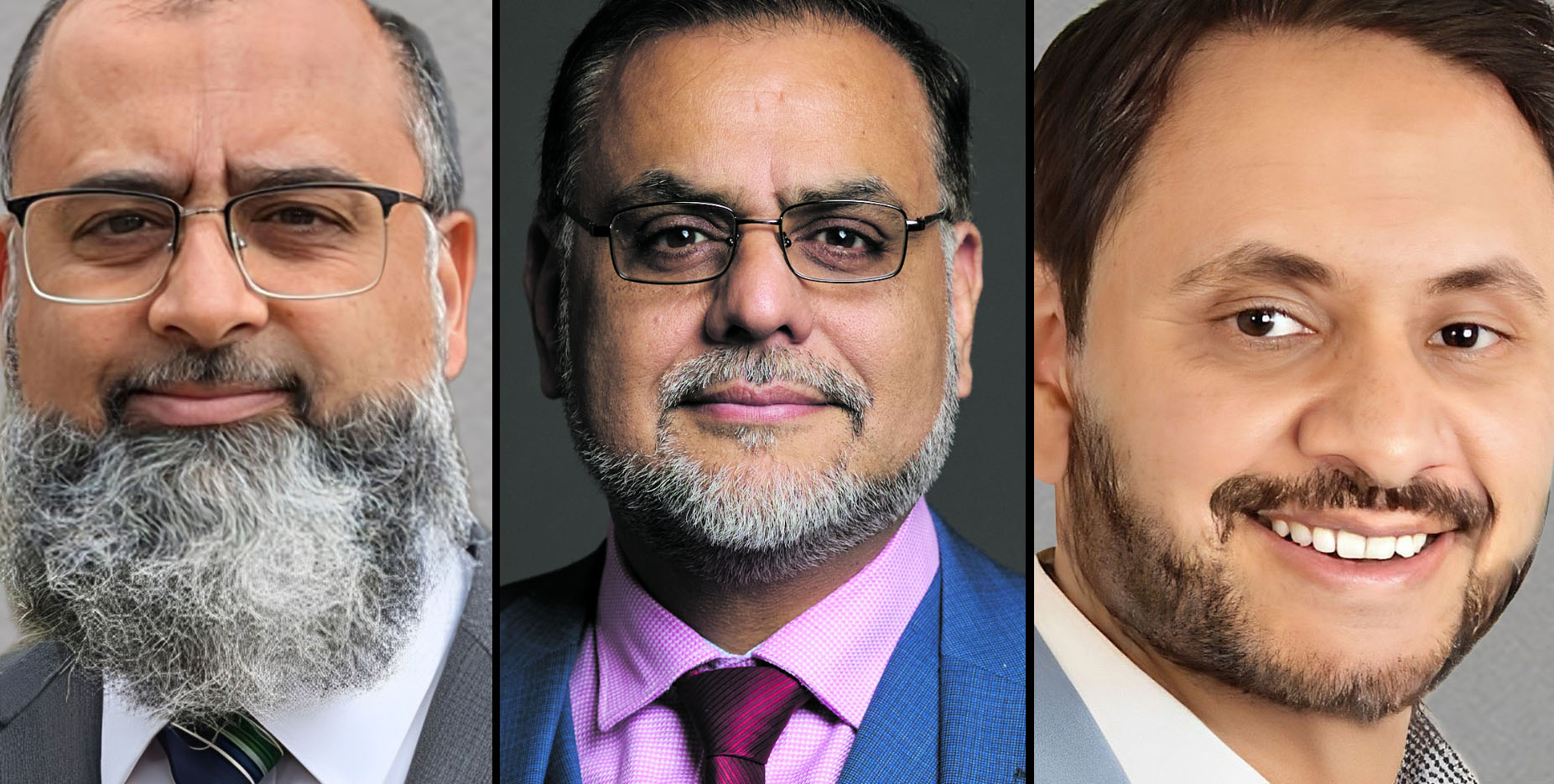
Following their historic victories in the recent UK general election, three of the five newly elected independent MPs— Iqbal Mohamed, Ayoub Khan, and Shockat Adam—shared their insights with The Muslim News editor, Ahmed J Versi. Each of them unseated long-standing Labour incumbents, signalling a significant shift in British politics. Ayoub Khan, now representing Birmingham Perry Barr, highlighted his commitment to tackling both local and global concerns, especially the Palestinian cause. Shockat Adam, the new MP for Leicester South, credited his grassroots campaign for connecting with voters disillusioned by traditional party politics, focusing on housing and healthcare. Iqbal Mohamed, representing Dewsbury & Batley, discussed his broad agenda, which includes combating austerity, improving healthcare, and addressing environmental issues, while also being vocal on international matters.
Mohamed, an engineer and IT consultant by trade, a remarkable win in Dewsbury & Batley made him Yorkshire’s first independent MP since 1907. His victory, beating Heather Iqbal, a former adviser to the new chancellor, Rachel Reeves, by nearly 7,000 votes, is widely seen as a reaction to dissatisfaction with Labour’s position on the Gaza conflict.
Despite his electoral success, Mohamed expressed “conflicted feelings” about the triumph, acknowledging the tragedy of ongoing Palestinian bloodshed in Gaza and the West Bank. “I felt honoured, proud, and humbled. But I felt like I shouldn’t be celebrating because the genocide is in the minds of most of my constituents and across the country,” he stated.
While the situation in Gaza was a key campaign issue, Mohamed emphasised that his platform extended far beyond foreign policy. He outlined a comprehensive agenda addressing local and national concerns:
“During my hustings, before I was selected as the sole candidate, my top five priorities out of the top ten were Gaza and stopping the killing,” Mohamed explained. “But there were many other issues unrelated to Gaza, including austerity and the decline in public services, protection of our NHS, and stopping privatisation.”
Mohamed detailed the local impact of austerity measures, particularly on healthcare services. “Many of the services in my local hospital that were there when my children were born 30 years ago are no longer provided locally. They moved everything away and reduced the capacity, and that increased the waiting times.”
He also highlighted environmental challenges and the need for renewable energy investment. “We have an environmental catastrophe. There are floods and heatwaves in Britain, there are third-world countries underwater, or they’re suffering drought. And this is all created by the excessive use of fossil fuels and their lack of investment in renewable energies.”
Responding to criticisms of independent MPs causing community division, Mohamed defended the democratic nature of his campaign and selection process. He drew parallels to the Brexit referendum, arguing that presenting different viewpoints to voters is a fundamental aspect of democracy.
“I didn’t force myself into parliament; I didn’t bully anybody to select me. I went through a very fair and rigorous process, and I was democratically selected to run for parliament,” he asserted. Mohamed detailed the extensive selection process, which included a community-created panel, rigorous applications, interviews, and public hustings.
He contrasted this with the Labour Party’s approach: “The Labour Party imposed an outside candidate who wasn’t local and who hadn’t been selected by the local community and parachuted her in to fight this election.”
Mohamed rejected claims of aggressive campaigning. “Our campaign was none of those things. There was one unfortunate incident, and maybe a person said things that were not illegal; the police investigated and dismissed it.” He added, “Nobody was stalked, attacked, or bullied in my campaign. And nobody from the other teams raised any issues with me or my team during the campaign.”
Looking ahead, he pledged to focus on immediate constituent needs rather than future electoral prospects.
“I’m not thinking about the next election until very near the time. I have been elected as an independent MP to fight for Dewsbury & Batley on core issues of equality, the cost-of-living crisis, the NHS, the environment, global justice, and peace,” Mohamed declared. He expressed willingness to collaborate across party lines, saying, “We will work with other MPs from any party to help our constituents and our country.” Mohamed highlighted his recent vote to abolish the two-child benefit cap as an example of this approach.
“In the second week [post-election], we had a vote on the amendment from the SNP on abolishing the two-child benefit cap. We had also proposed that amendment, but it didn’t matter whose amendment was selected. This was something we believed in,” he explained. Mohamed also commented on the recent riots, expressing concern over the government’s delayed response to Islamophobia. “It took the government four days or more to call what was happening Islamophobia. When we have politicians and governments who are unwilling to call out crime, racism, and Islamophobia for what it is, how can the public trust them to address these issues permanently?”
He strongly condemned the violence: “There is nothing more unpatriotic that I can think of than causing violence, attacking police and emergency services, vandalism, setting police vehicles and ambulances on fire, and setting buildings on fire with people inside.”
As he settles into his new role, Mohamed remains committed to transparent, grassroots representation. “We have the freedom to vote with our conscience. Nobody will remove the whip from us. We are our people; we are our party,” he concluded, reaffirming his dedication to the constituents who elected him to this historic position.
Mohamed’s election marks a significant shift in local politics, reflecting growing dissatisfaction with traditional party structures and a desire for more direct, community-focused representation. As one of five independent candidates who won the 2024 general election, his tenure will be closely watched as a potential model for a new kind of political engagement in the UK.
Khan, a local councillor and barrister, unseated long-standing Labour incumbent Khalid Mahmood, who had represented Birmingham Perry Barr for over two decades. Khan won by a narrow margin of 507 votes in last month’s general election, signalling a major shift in local politics.
Despite the brevity of his campaign, Khan’s victory was decisive. “We only ran a campaign for about two and a half weeks, and the victory was magnificent in terms of the lack of time we had to campaign and the result that we got,” Khan stated, expressing his elation at the outcome.
“I’m extremely honoured and privileged that I’ll be representing the Birmingham Perry Barr constituency.”
Khan emphasised that his mandate extends beyond foreign policy concerns to encompass pressing local issues. “There is clearly a mandate to talk about foreign policy, but there’s equally a mandate to talk about local issues that impact lives daily,” he explained. “My focus will be on not only issues that impact our communities directly, such as cost of living, homelessness, and inequalities of all magnitudes.”
However, he also pledged to be vocal on international matters: “The issue with the Palestinians, the issue with occupied Kashmiris, the issues with whatever. There’s injustice; I will be very vocal on that.”
In response to accusations that pro-Palestine Independent candidates ran sectarian campaigns, Khan strongly refuted such claims regarding his campaign. “I don’t know how other people ran their campaigns, but certainly, my campaign was very inclusive,” he asserted. “My social media platform demonstrates how I managed to muster support from all sections of the community.”
Khan highlighted the diverse support he received: “If you look at my social media videos, you will see a diverse community supporting me. And it spans all faiths and non-faiths, so I have a track record.”
Khan distanced himself from allegations of negative campaigning or smear tactics. “We certainly didn’t have any negative campaign insofar as that statement is concerned. Our campaign was very, very straightforward,” he stated. “People knew my stance on Gaza. People knew that I’ve always been very vocal wherever there’s injustice.”
He emphasised that his victory was not solely based on his stance on Gaza: “It wasn’t just the foreign policy on Gaza that got me elected. I’m firmly of the view that it was my community work, which I’ve done for many years, that got me in.”
Looking to the future, Khan sees his victory as part of a broader shift in British politics. “There’s an introduction of a new form of politics. The communities have demonstrated that they’re not interested in political parties, they’re not interested in people being shackled by parties, and they’re not interested in being spoken to about what the narrative should be,” he explained.
Khan stressed the importance of engaging with constituents: “Whenever there’s a topical issue, it’s our responsibility as parliamentarians to hold public forum meetings to understand what our community wants. And that’s not happened. And people are wise to that.”
When asked about his plans for the next election, Khan remained focused on his current responsibilities: “We don’t know where we will be in five years. There’s an introduction of a new form of politics.” He expressed confidence that his stance on topics “based on humanity, based on fairness and equality, will be primarily the reason why people will continue to support me.”
Khan also addressed speculation about potentially joining the Labour Party in the future: “I wouldn’t comment on anything such as that. Keir Starmer’s position is something that must shift significantly. There are no plans to join any political party at this moment in time.”
As he begins his tenure as MP, Khan’s victory serves as a testament to the changing political landscape in the UK. His success as an independent candidate reflects a growing desire among voters for representatives who are directly accountable to their constituents and willing to take strong stances on both local and global issues. As British politics continues to evolve, Khan’s approach and performance in parliament will be closely watched as a potential model for a new kind of political engagement.
Adam, a 51-year-old Leicester optician, shocked the political scene by unseating shadow Cabinet Office minister Jonathan Ashworth, overturning a 22,500 Labour majority in a supposedly safe seat. Reflecting on election night, Adam recalled feeling “overwhelmed, excited, exhilarated, and frightened.”
“I don’t think there is an adjective for the feeling,” he said. “It was everything in one. Disbelief, but relieved.” The new MP credits his victory to grassroots, community-focused campaign that resonated with disenfranchised voters across Leicester South.
“It was a concerted effort, using a very community- and constituency-based campaign with a very grassroots, bottom-up approach,” Adam explained. He noted widespread disillusionment with established parties, saying many constituents told him: “We don’t vote; there’s no point.” Adam’s local roots and independent status proved appealing to voters seeking an alternative. “I managed to fill that vacuum by saying, ‘I’m independent; I’m local. Everything that happens in the city matters to me.’”
While the situation in Gaza was a significant factor, Adam emphasised that his campaign addressed a broad range of local issues.
“The most pressing issue is housing,” he stated, citing concerns over affordable housing and tenant rights. As an optometrist and small business owner, he also focused on healthcare reform and support for local enterprises.
“We had voters from every background; otherwise, we would not have won this election,” Adam noted, pushing back against characterisations of his victory as solely driven by the Gaza issue. Adam’s political journey began long before this election. For over a decade, he has been advocating for greater community engagement in politics.
“There always has been this narrative that never sat well with me, that the community is allowed to engage to a certain capacity, after which there seems a lot of disengagement,” he explained.
Events like Brexit and the government’s handling of the COVID-19 pandemic further motivated Adam to take action. “When Brexit happened, the issue wasn’t the actual Brexit vote—people can vote whatever way they like—it was the narrative that was being peddled. Xenophobic and racist comments that were in the background were now acceptable conversation in the forefront.”
The conflict in Gaza proved to be the final catalyst for Adam’s decision to run for office. He expressed frustration with the lack of response from incumbent MP Jonathan Ashworth on the issue, stating, “There was complete silence from the incumbent… which was unacceptable.”
Addressing allegations of aggressive campaigning by his supporters, Adam drew a clear distinction between legitimate democratic engagement and unacceptable behaviour.
“I would never condone any form of aggressive behaviour. But we must ensure not to conflate robust and frank questioning with vitriol and aggression,” he said. “From what I know so far, if other information comes to light, then obviously the story could change. This was very robust questioning in public, in front of lots of other people, including supporters of John Ashworth.”
Looking ahead, Adam sees his role as an independent MP as crucial in holding the government accountable.
“Never in the history of this country has there been five independent MPs sitting in one parliament, it’s incredible,” he remarked. “The presence of these independent MPs, including myself, who have swung huge majorities, is a reminder that the government is accountable to its constituents.” Adam believes both major parties need to reflect on recent electoral setbacks. “Labour must have a sense of humility. Why have they been rejected in former stronghold seats? Our role is to remind them that they will be held accountable.”
As he settles into his new role, Adam remains committed to putting his constituents first. “When you’re an independent, you’re not as partisan, you want to do the right thing. I’m doing the right thing for my constituents. I’m not behest to a leader or party.” With a focus on unity in Leicester’s diverse community and a pledge to work across party lines, Shockat Adam represents a new breed of politician in British politics. As an independent voice in Parliament, he aims to bridge divides and champion the concerns of his constituents above all else.


